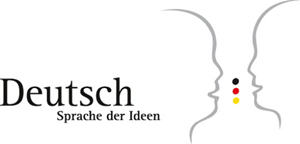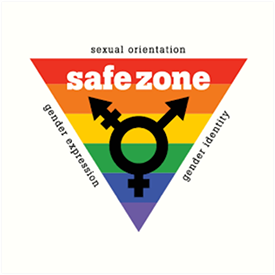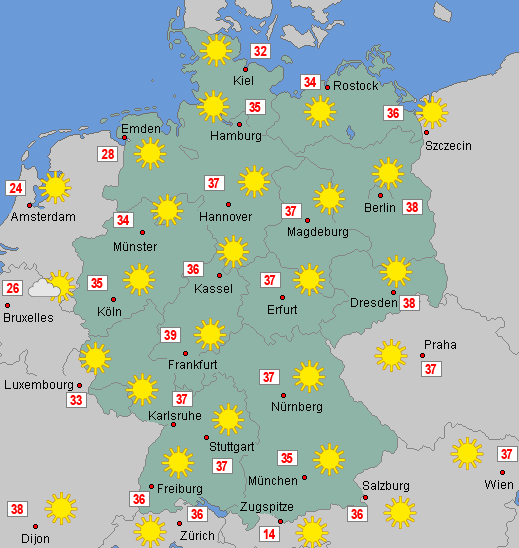Kapitel 1
Einführung. Introduction. Greetings, alphabet, numbers, common objects, colors, common activities, time, schedules, likes and dislikes

CATALOGUE DESCRIPTION: Develops the four language skills and acquaints students with elements of German-speaking cultures. For students with no more than two years of German. Requires practice in the language laboratory. Prerequisites: none.
GOALS AND OBJECTIVES: Students need to perform at the novice-mid level in German as described by the American Association of Teachers of Foreign Languages proficiency guidelines.
Specific Goals of German 101:
Speaking and Writing Ability
◊ handle selected rudimentary tasks and social situations requiring an exchange of basic information related to
a. work,
b. school,
c. recreation,
d. self, family, home,
e. daily activities,
f. interests and personal preferences,
g. physical and social needs, such as food, shopping, travel and lodging;
◊ narrate and describe in familiar areas (personal information, common events) in the present tense;
◊ begin to use cohesive devices (conjunctions, etc.) in connected discourse of more than one sentence or phrase;
◊ respond to direct questions or requests for information and ask a variety of questions to obtain simple information to satisfy basic needs, such as directions, prices, and services;
◊ use elements and conversational input to make utterances of sentence length and some strings of sentences.
Reading and Listening Ability
◊ skim and scan for information from texts at the novice-mid level
◊ decifer survival texts, such as schedules and signs
◊ understand and participate in basic conversational exchanges related to the desired speaking ability
|
New Studying Resource: CircleIn
Bloomsburg University has made CircleIn, an all-in-one studying app and website, available to all BU students. When students wish to talk to other students in class for clarifications, practice, or get help from others in class, this app is an ideal platform. By using CircleIn students can earn rewards and scholarships. |
The following are some examples of disruptive acts during class:
Any and every act of misconduct will affect grades; in the worst cases, such as plagiarism or cheating, students will fail the course.
Students who commit an act of academic misconduct will be subject to sanctions as stipulated by the university. See BU Policy 4802 secton H.
NOTE: Regarding the Student Health Center (SHC): The SHC does not issue student illness excuses for missed classes.

◊ Attendance and regular active participation is essential. Every absence and lack of preparation will diminish the final grade.
◊ Students are responsible for any and all assignments posted on BOLT, to be completed by the due date.
◊ Students are responsible for any and all assignments sent to their BU email address (University policy).
◊ Written essays must be submitted as an MS-Word document in the disignated folder on BOLT.
◊ No assignments will be accepted as email attachments. Each chapter composition may be factored as a percentage of the chapter test.
◊ Voice recordings will be submitted on BOLT. Students may be required to use the resources in the Language Laboratory in the Department of Languages and Cultures, except when pandemic precautions prevent use of computer labs.
◊ Assignments are accepted on the due date only, unless there is compelling need to submit a late assignment.
◊ Students are responsible for all computer assignments and must use a computer that can access and operate all the required files and functions. The language laboratory is available for all computer activities, except when pandemic precautions prevent use of computer labs.
◊ Two hours of preparation is expected for each hour in class--six hours of preparation per week.
◊ Students are expected to study the material. Completing assignments and attending class are only part of the learning process. The textbook gives ample explanations. Many assignments are preparation for class activities and will be due before the material is covered in class.
◊ Attitude will contribute significantly to the final grade, even though it is not evaluated in quantative terms.
◊ The final exam for GERMAN 101-01 is on Monday, 9 May 2022, 08:00AM-10:00AM. The final exam for GERMAN 101-02 is on Monday, 9 May 2022, 10:15AM-12:15PM.
◊ Grades posted on BOLT do NOT represent the official grade record; grades posted on BOLT allow students to gauge their progress during the semester.
◊ No extra credit assignments will be given.
◊ These procedures are subject to change at any time.
Grade distribution (tentative):
◊ Projects, essays, quizzes, and assignments: 25%
◊ Active participation in class and in other activities: 25%
◊ Tests and oral interviews: 25%
◊ Final: 25%
◊ It is required to bring the print copy of the textbook - purchased through the BU bookstore - to every class session day. (Printing off the web site or using a previous edition of the textbook is NOT acceptable.)
◊ Textbook website link (no cost): This website links to electronic resources and exercises..
◊ The print version of the textbook will be available at the BU bookstore.
◊ Exercises, quizzes, and other assignments will be posted on BOLT.
◊ Standard 8½" by 11" lined writing paper, either loose-leaf in a binder or a bound notebook.
◊ Internet sites and apps as needed.
◊ Supplementary materials furnished by the instructor at no cost.



The lesson plan only sets approximate goals and can be changed at any time.
For the complete tentative schedule of lessons: GERMAN 101 calendar

Einführung. Introduction. Greetings, alphabet, numbers, common objects, colors, common activities, time, schedules, likes and dislikes

Talking about the weather; German states and cities; countries in Europe and nationalities; plurals of nouns; gendered nouns (professions, etc.); calendar dates and seasons; to have and have not; verbs "to see" and "to read"; television in Germany.

Essen und Einkaufen: eating and shopping. Names of foods and stores, phrases for shopping, German cuisine, things one needs to purchase, packaging and units of measure, prices, restaurants, abilities, polite requests

Familie und Freunde: talking about family and friends, describing people, wanting and needing to do something, plans for the weekend, inviting friends, to know and not know, question words
There is no chapter test for Kapitel 4